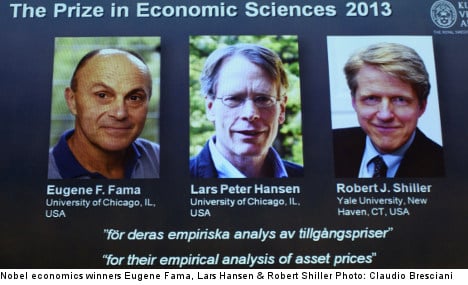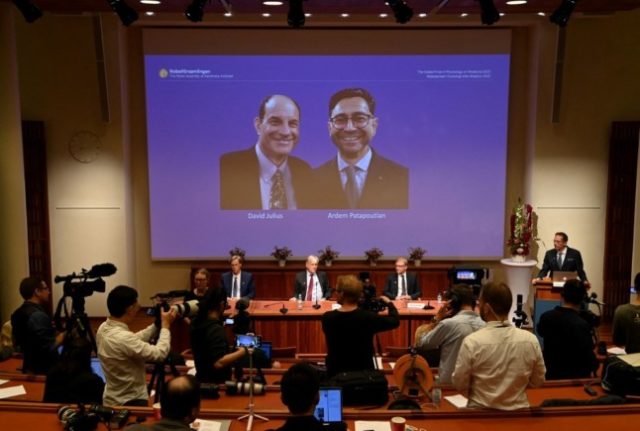Eugene Fama, Lars Hansen, and Robert Shiller won the prize “for their empirical analysis of asset prices”.
“The laureates have laid the foundation for the current understanding of asset prices,” the Royal Academy said in a statement.
Reached on the phone in the United States, Shiller was shell-shocked at the news he’d won the Nobel.
“Disbelief, that’s the only way to put it,” he told reporters.
“A lot of people told me they hoped I would win, I am aware there are so many other worthy people that I discounted it.”
Speaking with officials from the Nobel Foundation following the announcement, Hansen said he was “very surprised” to have won, while Fama said he was “thrilled”.
Fama and Hansen are both professors at the University of Chicago, while Robert Shiller teaches at Yale University.
The economics laureates were unveiled at a press conference at the Swedish Royal Academy of Sciences at Stockholm University.
Eugene Fama was born in Boston in 1939, and studied at the University of Chicago, where he is now a Distinguished Service Professor.
Lars Peter Hansen was born in 1952, and studied at the University of Minnesota. He is now a Distinguished Service Professor at the University of Chicago.
Robert Shiller is also a US citizen, born in Detroit in 1946. He studied at Massachusetts Institute of Technology, and is now a Sterling Professor of Economics at Yale University in New Haven.
In fielding questions following the announcement, Shiller called the field of finance “fundamental to human activity”.
“Finance is a theory that while it has many controversial elements, is useful for society and is important to human welfare. I’m glad to see this has been given recognition,” he said.
He admitted, however, that there was still much to learn in the wake of the financial crisis of 2008 and 2009 which continues to affect parts of the global economy.
“The financial crisis reflected mistakes and imperfections in our financial system we’re already working on correcting those mistakes, but it will take decades,” he said before nevertheless striking a note of optimism.
“There have been financial crises many times throughout history, and we’ve learned from them,” said Shiller.
Commenting on the work of the three researchers, Eva Mörk, an economics professor at Uppsala University, explained that the new laureates were looking at whether asset prices were “predictable or unpredictable”.
“In the 1960s, Fama found that in the short run, asset prices are not predictable,” she told The Local.
“It’s very hard to beat the market, you can’t use past information about to predict future prices. If you read it in the paper in the morning, it’s too late to react because the market has already reacted.”
In the 1980s, Shiller looked at asset prices over longer time horizons and found that they fluctuated more that one might expect based on the dividends paid out.
“He began to see peculiar patterns in the data that were hard to analyze using traditional models,” Mörk said.
“We believe that asset prices should reflect future dividends, but what he found was that prices varied a lot more than future dividends. Something else was going on.”
Shiller pioneered a new field, behavioural finance, but it was thanks to Hansen’s innovations in modelling that allowed the work of this two fellow laureates to be tested in a much simpler and targeted way.
“Hansen’s methods, combined with the findings of Shiller and Fama “told researchers in finance that new thinking was needed” said Mörk.
“We learned that we can’t hold on to our existing theories; that we need to continue so we can better understand the data,” she added.
The Uppsala professor admitted that some may question awarding the researchers in finance as the global economy continues to struggle with the effects of a financial crisis.
“But I would argue that it’s even more important when we see that these things matter so much,” she said.
“If it wasn’t for these laureates, we’d probably have much bigger problems understanding what’s happening today.”
Despite the advances brought by Shiller, Fama, and Hansen, “there are still a lot of things that we don’t know” Mörk continued.
“We don’t have all the answers yet, but thanks to the laureates, we are in a much better position to understand things, and hopefully in the future we’ll be in a better position to understand how we should regulate financial markets in order for them not to fall apart,” she said.
The prize has been awarded since 1969 by the Bank of Sweden (Sveriges Riksbank), which pays the Nobel Foundation’s expenses associated with the prize, as well as the monetary award.
SEE ALSO: Stockholmers speak about their favourite Nobel Prize
While not technically a “Nobel Prize”, as Alfred Nobel only left money in his will to physics, chemistry, physiology or medicine, literature, and peace, the economics prize is always presented together with the other prizes in Stockholm in December.
Last year’s economics prize went to US economists Alvin E. Roth and Lloyd S. Shapley “for the theory of stable allocations and the practice of market design”.
The 2013 Nobel Prizes in medicine, physics, chemistry and literature and the Nobel Peace Prize were all announced last week in Stockholm and Oslo. All awards will be handed out on December 10th, the anniversary of Nobel’s death in 1896.
Follow our live blog of the 2013 Nobel Prize announcementshere.
The Local/og/dl



 Please whitelist us to continue reading.
Please whitelist us to continue reading.
Member comments